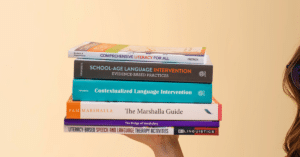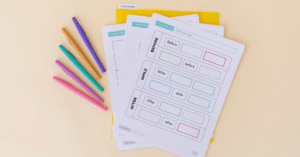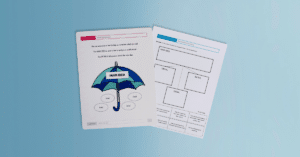Listen on Apple Podcasts Listen on Spotify
This Week’s Episode: How to Integrate Curriculum into Therapy with Our Early Elementary Students
Let’s continue our trip on the curriculum-based therapy train and talk about some ideas for our early elementary learners! 🚂
With this month’s learning series, our aim is to take those literacy-based therapy strategies that we’ve been talking about, and embed the strategy into the classroom by applying it to materials from the curriculum.
Last week we targeted some language comprehension, vocabulary and grammar with our preschoolers. The specific targets were answering questions about a story, identifying basic concepts, and producing three-word sentences that are grammatically correct.
This week I share an example of how I was able to collaborate with a teacher to help a student that was struggling with math word problems!
When I first heard this, I was a little bit unsure…speech language pathology and math aren’t exactly known for going hand-in-hand. 🤣
But as I thought about it and looked at the student’s goals, I became convinced that this was a really great area for me to support!
Let’s dive in and focus on how to target answering questions, identifying key details, defining tier two vocabulary words, and producing compound or compound complex sentences with our later elementary students.
Strategies + Tips Discussed:
– Collaborate with the teacher to target goals
– Observe the teacher to see what kind of language is being used in class
– Pre-teach instructional verbs and unknown words that are being used in class
– Act out the word problem
– Create vocabulary journal
Reference
– Lowman et al. from 2018 that talks about teaching kindergartners instructional verbs, and I really loved their approach. In this study they recognize the importance of instructional verbs and they wanted to see if they could teach these kindergartners 12 words that they thought were really important.
Here’s what we discussed:
[3:50] Therapy Ideas for Step 1 (Pre-Story Knowledge Activation)
[6:50] Therapy Ideas for Step 2 (Reading)
[6:55] Therapy Ideas for Step 3 (Post Story Comprehension)
[7:09] Therapy Ideas for Step 4 (Skill Practice)
Want to hear more about this topic? Click here to see this month’s content!
Links Mentioned
– June Therapy Materials
– The SLP Now One-Page Literacy-Based Therapy Unit Planner
Subscribe & Review in iTunes
Are you subscribed to the podcast? If you’re not, subscribe today to get the latest episodes sent directly to you! Click here to make your listening experience auto-magic and as easy as possible.
Bonus points if you leave us a review over on iTunes → Those reviews help other SLPs find the podcast, and I love reading your feedback! Just click here to review, select “Ratings and Reviews,” “Write a Review,” and let me know what your favorite part of the podcast is.
Thanks so much!
Transcript
Here we go. Let's continue on the curriculum based therapy train and talk about some ideas for early elementary. So some of the goals that I'm targeting with this hypothetical group include answering questions, identifying key details, defining tier two vocabulary words, and producing compound or compound complex sentences. And so in this hypothetical, but also kind of similar to a real group that I've had, when I started implementing curriculum based therapy I went to the teacher of these students and I reviewed the student's goals with her.
So this is what Johnny and Anita and Juan are working on. So I reviewed the student's goals and I asked the teacher about her goals, like, "Where do you see them struggling?" And this particular teacher happened to have a professional ... or actually all of the second grade teachers had a professional learning goal to reach a certain benchmark for math word problems.
So when I first heard this, I was a little bit unsure, but the more I thought about it and the more that I'd looked at the student's goals, the more that I was convinced that this was a really great area for me to support, because math is way more than just numbers and operations. Math is incredibly rich with concepts in terminology, and the math isn't what was hard about the math word problems. It was understanding what was written, understanding the vocabulary. And then also the students were required to explain how they got to the correct answer.
So by pulling in these math board problems, it was a perfect way to target answering questions, identifying key details, defining tier two vocabulary words, and producing compound and complex sentences. I could not have thought of a better activity. So I got really excited as we started diving into these units and it ended up working out really well.
So I thought it would be fun to share something a little bit out of the box. And so just an example of a word problem that they might have been working on was, Joe had 40 marbles. Marlin gave Joe some more marbles. Now he has 65 in all. How many marbles did Marley give Joe? So if your brain is spinning already, my students' brains were absolutely spinning. So it's really a simple equation. It's just 65 minus 40 equals 25. So Marley gave Joe 25 marbles, but the students were really overwhelmed with language side of things, for a variety of reasons.
Then they were also required to produce some pretty complex language to explain their thinking as well. I hope your wheels are already turning too, because there's so, so much that we can do with this. So if you want to follow along with the literacy based therapy planner, this'll be a little bit different. And if you want to follow along, you can head to SLPnow.com/planner.
When we're working with a word problem, we can still take some of the steps. So we can take a word problem walk instead of a book walk for the first step of pre-story knowledge. So we'll look at the word problem and just see what we notice. A lot of times there's vocabulary that is challenging. When I was working on the word problems with these students this was kind of part way through the year. They had already been doing these word problems for a while. So I asked to get a stack of just the past word problems, and I went through and identified the vocabulary words that might be tricky for my students. And so I worked on making a list of ones that we might need to target.
This was inspired by, there's a really cool article by Lowman et al. from 2018 that talks about teaching kindergartners instructional verbs, and I really loved their approach. So in this study they recognize the importance of instructional verbs and they wanted to see if they could teach these kindergartners 12 words that they thought were really important. So, I worked with the teacher to identify the most important instructional words, and then they taught them and they taught them to preschool years before they went into kindergarten.
I thought that was a really cool well approach. And so I was like, "Can I use this? Can we identify vocabulary that students need within the word problems?" And then also there are some tier two words that they would need to use to explain their reasoning. So more of the thinking words, so that, I thought that was a really cool opportunity.
Then I observed the teacher giving a lesson or two just to see what her language was around it, and that could also be a good way to identify key vocabulary words to target, and then we could kind of work from there and prioritize the different targets. I could check in and do like a quick probe with the students to see for the students who have vocabulary goals to see which words we need to teach and all of that good stuff.
So we might do some pre-teaching of vocabulary. That was a very long tangent to say that we can pre-teach vocabulary too. We could identify unknown words in the word problem, or we could do like a little bit of a unit really honing in on the words that they need to explain their thinking and have some different practice around that. So that's what we've got for step one. And we might kind of act out some stuff if they're having ...
Because I think a lot of times the students seem to get overwhelmed with the language, so just acting out the word problem was a helpful strategy. It made it feel a little bit more approachable and that made the math part easier, but then it also made it a lot easier to actually solve the problem. So for step two, we would just read the problem. And then for step three, the comprehension, we would break it down and identify the most important parts. I might ask some basic questions just to make sure they understood it.
Then we would go into step four where we really work on our skills. So this is where we would work on identifying the key details, using that tier two vocabulary, producing those compound and complex sentences. I can take some time for teaching here, and if you want specific strategies for how to teach vocabulary, like I love a good vocabulary journal. I think that would be very appropriate here, especially since we would be coming back to these word problems.
Then I would also refer back to the grammar episodes for strategies for compound and complex sentences. But yeah, that's how it's definitely not a clear fit into literacy based therapy framework, but I think we can use some of the strategies that we've learned. And I think it's just a good example of how we can take something that we might not always consider as a good language target, but this ended up being really effective. The teachers were incredibly motivated to work with me. I got one of those word problems in my box multiple times a week, whereas before I implemented this, I was just, it was really hard to get anything from them. And it was something that the teachers were very motivated to collaborate on this. They were able to use some of the strategies. We worked together on some of the strategies.
So they were able to implement that, and it benefited students that weren't even on my caseload. So it's just a really cool way to get teacher buy-in, but also have a significant impact on our students and students that aren't in our groups or that aren't on our caseload. So just a really cool way to have an impact and all of that good stuff. So hopefully that gave you a good overview. I'd love to hear how like a unique therapy target that you might be inspired to use, and if you have any questions on how to implement some different strategies, I would absolutely love to chat and brainstorm. So next step is later elementary.
Sign up to receive email updates
Enter your name and email address below and I'll send you periodic updates about the podcast.




Hoping the transcript is up soon. 🙂
Hey Jennifer!
Good catch! The transcript as been added!